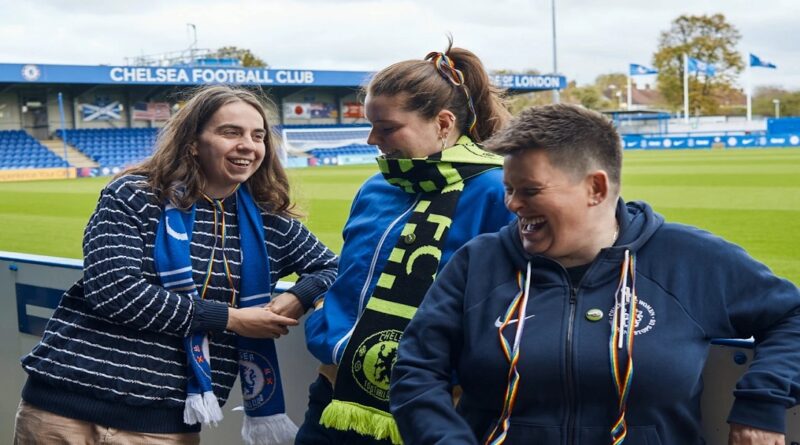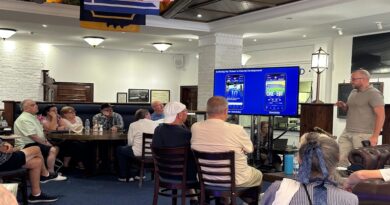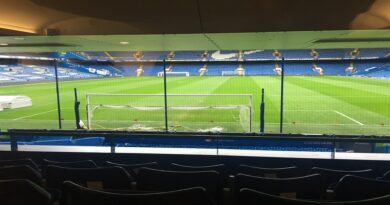Whoever You May Be – driving LGBTQ+ visibility and inclusion in football
From the official Chelsea FC website:
This November, Chelsea Football Club is championing our LGBTQ+ fans as part of the 2024/25 Rainbow Laces campaign to challenge homophobia and create meaningful change across all levels of the game.
For this year’s campaign, LGBTQ+ journalist Snake Denton sat down with three trailblazing supporters at Kingsmeadow for a powerful conversation about identity, community, and the fight against discrimination.
Those fans are:
- Tracy Brown, chair of Chelsea Pride and a supporter advisor to the board at Chelsea FC
- Rose Aaliyah, captain, manager and right winger at Shepherd’s Booters, a west London grassroots team for women and non-binary people.
- Clara Brown, lifelong Chelsea fan and player for Shepherd’s Booters.
Here’s what they had to say…
What does it mean to star in Chelsea’s Rainbow Laces campaign?
Tracy: I’ve been running the club’s LGBTQ+ supporters’ group, Chelsea Pride, and doing this with the club for eight years now. Rainbow Laces is about getting everyone to understand what it means to be a part of our community, because it can easily get lost in translation.
I think some people assume we just put a bunch of rainbow flags up and that’s all there is to it, but the campaign is about so much more than just ticking a box. There’s a stronger message behind all of this about representing and empowering our community, so that everyone understands who we are and what we stand for.
Clara: I feel supported knowing that my club has put so much effort and thought into this campaign. Chelsea and the community around it are close to my heart. As Tracy said, Rainbow Laces is about more than just a flag, it’s about showing support for a community who haven’t always been made to feel welcome in the game. That’s so important because young people shouldn’t feel like they have to hide their identity, or keep it separate, when they come to matches.

Rose: It means a lot to be a part of this because representation is so important. Clara and I play for a grassroots team called Shepherd’s Booters FC, where there’s a lot of LGBTQ+ players, but we need to see the same thing at the top levels of the game too.
Why is it so important for there to be more LGBTQ+ visibility in football?
Tracy: It’s important because there’s still so much work to do, to educate people and change perceptions about LGBTQ+ people. Some people assume that our community is only connected to the women’s game, but we’re sitting in Stamford Bridge as much as we’re sitting in Kingsmeadow.
Obviously there’s more visibility in the women’s game, but I want to get to a point where players in the men’s game feel safe enough to come out too. I’m often asked by journalists: do you think a men’s player is going to come out soon? And my answer is: would you come out? Because I wouldn’t – there’s still so much abuse in the stands – I wouldn’t feel safe to.
Rose: I think visibility and representation are really important because LGBTQ+ people also need to have role models in the game. It’s crucial that all different types of young people are able to see themselves on the pitch and in the stands. Obviously there’s still a lot of work to do, but campaigns like this are a step in the right direction.

Why are homophobic chants so damaging?
Clara: When you hear homophobic chants at the game it can sour the whole experience because it makes you feel isolated and unwelcome. You can try to brush it off but those feelings will still linger. Just because something casually slips out of someone’s mouth doesn’t mean it will casually slip out my mind.
Tracy: We still hear it. We still fight it. I’m one of the people who helped change the law so that fans can be prosecuted for homophobic chanting, and I stand in court, and I fight against people all the time who believe that there’s nothing wrong with it.
We need to educate people on the history of those chants, and how damaging it is to be discriminated against. I think we’ll get there – we have much less homophobia in the crowd nowadays, but it’s still there, which means there’s still work to do.
Rose: It goes beyond chanting too. Homophobic language is so common in football, and in society as a whole. I remember at school, if you cried in lessons or showed any emotion, really, people would call you gay. Maybe people don’t realise that casual homophobia is still homophobia, and still harmful to the members of our community.
How has football helped you find and grow your community?
Tracy: It didn’t help me find it; it helped me create it. My goal has been to bring Chelsea’s entire LGBTQ+ fanbase together under an umbrella. The whole point of Chelsea Pride is to create community and drive change.

We’re also lucky to have a huge number of allies who support our cause regardless of their sexual orientation or gender identity. There’s strength in numbers, and oftentimes our LGBTQ+ allies are the ones who can really make their voices heard.
Rose: We’ve created an amazing community at Shepherd’s Booters FC. It’s a space where people feel safe to be openly queer. Not all of our players have that in their social circles or in the workplace. Even just to have a couple of hours on the pitch a week where they feel seen and supported makes a big difference.
Clara: I loved football before I found any kind of LGBTQ+ community. But it’s been so warming to find out about groups like Chelsea Pride, and so good to know that there’s a big contingent of supporters who get me.
What can the men’s game learn from the women’s game in terms of LGBTQ+ inclusion?
Tracy: Sometimes I get told I shouldn’t be at Stamford Bridge because I don’t fit in. And my reply is: no, you don’t fit with your closed attitude. At the end of the day we’re people. We’re Chelsea fans. We have as much right to be at the games as anyone else. So there needs to be more acceptance and education in the men’s game. It really is that simple.
At the moment I think education needs to be focused around our trans community because we get hammered left, right and centre.
Clara: Queerness in the women’s game is so normalised that I don’t even really feel the need to bring my identity up, which is nice. I wish it was that normal in the men’s game, but obviously it’s not, which is why it’s important that we have conversations like this one.
What advice would you give to someone who is struggling to navigate their gender or sexuality?
Rose: Find a community – I know that’s easier said than done, but community is so powerful. Maybe that could look like finding a game of football with a group of girls in the park, or maybe it looks like joining a grassroots club. I think being around like-minded people is so important.
Tracy: Absolutely agree. It’s so empowering to find a community of people who really get you. There’s loads of different places you can go. Obviously it’s easier if you live in a city, but either way, don’t give up on being yourself, and don’t just stay in the closet because you think no one’s there to support you. There’s a whole community ready to do that and to make that walk with you when you’re ready.

Clara: Don’t put pressure on yourself to be a certain way. Just because you’re coming out doesn’t mean that you need to act differently. Just relax, be kind to yourself, and don’t overthink things.
What is one thing you wish people understood about being an LGBTQ+ Chelsea fan?
Tracy: That I’m the same as bloody anyone else! I’m human. Shut up. Move on.
Clara: My identity is just to do with me. It doesn’t need to affect you.
Rose: It’s not that big of a deal – it’s as simple as that – all we want is for people to be respectful. We’re here for the football just like everyone else.
‘Chelsea Supporters Group’ can also be found on X and Facebook






